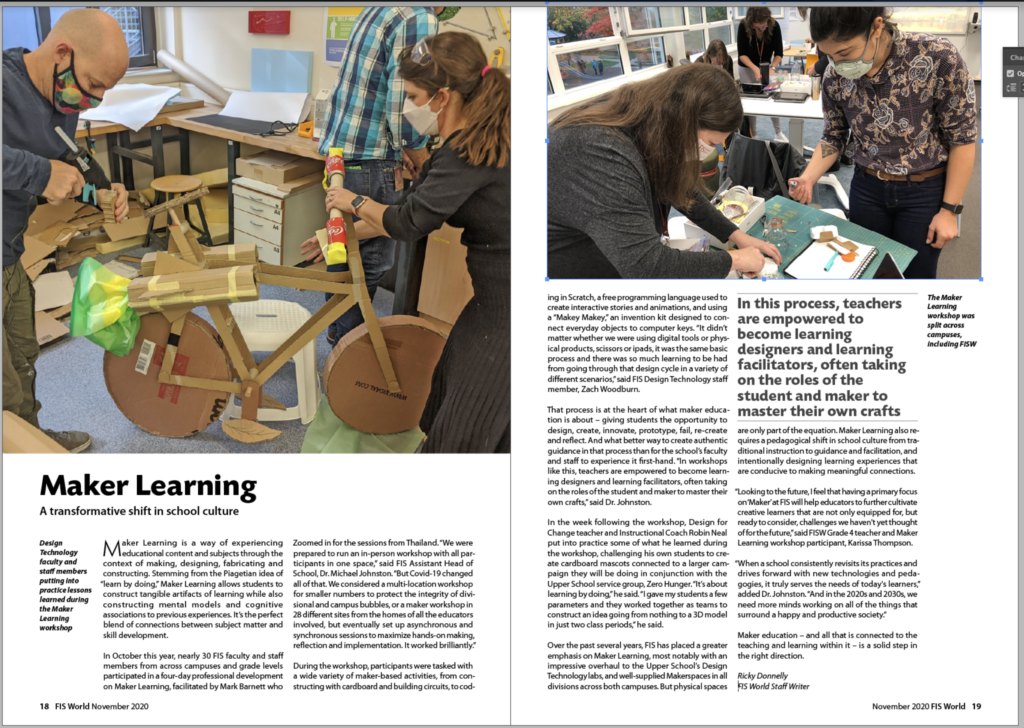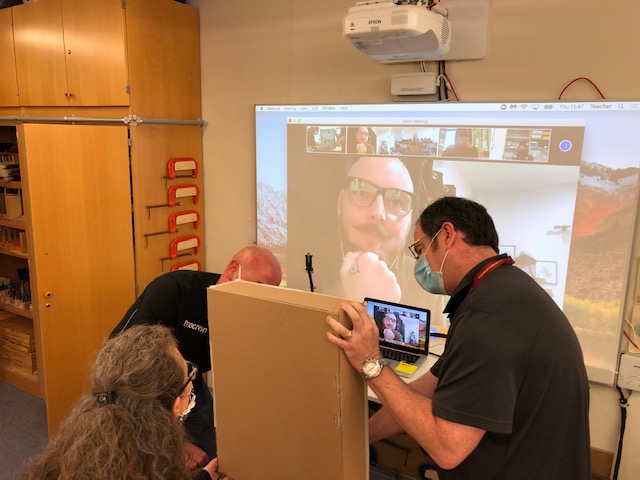We can’t allow learning to stop for students and the same goes for our teachers, the pandemic has just shifted the way we conduct learning and professional development. Frankfurt International School and Consilience Education Foundation found a way to run an asynchronous and synchronous blended learning experience of hands on making, innovation and design with the facilitator 6 time zones away and restrictions on the number of people that can occupy a physical learning space. Robust learning for adults that impacts student learning is about personal experiences and self motivation. This four day learning experience has already impacted student experiences and will continue to help shape the future of learning at FIS to help foster creativity, confidence and resilience for our young innovators.
“Instead of pushing kids to be more like adults, we might do better to remember that they are great learners and to try harder to be more like them.” – Seymour Papert, from The Children’s Machine
Fostering a Culture of Innovation and Learning at FIS – Video
Philosophy of Maker Learning and Constructionism
Maker Learning is a way of experiencing educational content and subjects through the context of making, designing, fabricating and constructing. Stemming from the Piagetian idea of “learn by doing,” Maker Learning allows students to construct tangible artifacts of learning while also constructing mental models and cognitive associations to previous experiences, thus allowing connections between subject matter and skill development. Maker Learning requires a pedagogical shift in school culture from instructionism, to guidance and facilitation and also by intentionally designing learning experiences that are conducive to making meaningful connections.
Seymour Papert, inventor of the first programming language for children and inspiration for the LEGO Mindstorms robotics systems laid the foundation for Maker Learning in his development of the learning theory called constructionism. 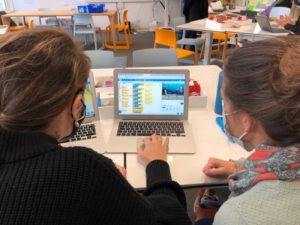 Building on the Piagetian term of constructivism, constructionism posits that learning happens most conducively when children are engaged in meaningful projects that allow for the construction of new knowledge in environments that make use of tools and materials as objects to think with. Papert would often share the famous African parable of “teach a person to fish, rather than provide the fish” and believed that education should be no different. We should provide children with the means to learn and the means to be the leaders of their own learning instead of providing a pre-baked curriculum taught through textbooks and lectures.
Building on the Piagetian term of constructivism, constructionism posits that learning happens most conducively when children are engaged in meaningful projects that allow for the construction of new knowledge in environments that make use of tools and materials as objects to think with. Papert would often share the famous African parable of “teach a person to fish, rather than provide the fish” and believed that education should be no different. We should provide children with the means to learn and the means to be the leaders of their own learning instead of providing a pre-baked curriculum taught through textbooks and lectures.
What We Did
2020 has been a challenge to say the least. The world of education has not been disrupted globally in this way since World War Two. What does this mean for next steps? How can we leverage this disruption to move education in a direction that serves the needs of learners in the 2020’s?
Frankfurt International School (FIS) is leading the way in many aspects and has the will and drive to continue to push the limits. When we originally planned the 4 day Maker Educator Certificate workshop there was no sign of a pandemic and very little discussion around blended, hybrid, DLP’s, asynchronous and synchronous learning. 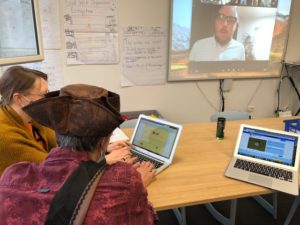 Our reality has changed, so now what?
Our reality has changed, so now what?
The show must go on. Consilience Education Foundation, the organization providing the workshop, is based in India. Their Maker Learning facilitator, Mark Barnett, resides in Thailand. We were prepared to run an in-person workshop with all participants in one space, a multi location workshop for smaller numbers to protect the integrity of divisional and campus bubbles, or a maker workshop in 28 different sites from the homes of all the educators involved. We eventually set up asynchronous and synchronous sessions over four days to maximize the direct contact inputs with the support and hands on making, reflection and implementation planning.
Outcomes
To see 28 adults engaged in creating, playing, prototyping, failing, re tooling and trying again was a joy and a stark reminder as to the importance of giving time to design and innovate. In a world pressed by time limits it is no different in schools as subjects, transitions and schedules drive students from place to place to learn in sometimes disconnected silos. 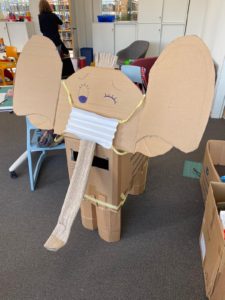 The ah-ha moments were vast in this learning experience for all adults and this will directly translate into the development of skills and attributes for FIS learners of all ages. When one of the teachers shared, “I never thought I could code,” the discussion quickly turned to the connected nature of design and innovation. Throughout the workshop, they were making with cardboard, circuits, coding in Scratch, using a Makey Makey, hot glue guns, a wide variety of materials. A group of teachers from various disciplines and age groups shared, “It doesn’t matter whether we are using digital or product design, scissors or iPads, it’s all the same process, and there is so much learning to be had from going through the process, and failing many times”.
The ah-ha moments were vast in this learning experience for all adults and this will directly translate into the development of skills and attributes for FIS learners of all ages. When one of the teachers shared, “I never thought I could code,” the discussion quickly turned to the connected nature of design and innovation. Throughout the workshop, they were making with cardboard, circuits, coding in Scratch, using a Makey Makey, hot glue guns, a wide variety of materials. A group of teachers from various disciplines and age groups shared, “It doesn’t matter whether we are using digital or product design, scissors or iPads, it’s all the same process, and there is so much learning to be had from going through the process, and failing many times”.
FIS is dedicated to lifelong learning and can’t wait to provide these kinds of learning experiences in Maker Fairs and community events, post-Covid, of course. 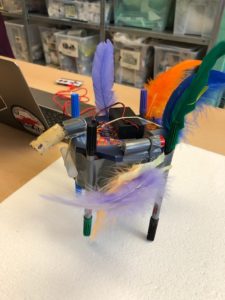 In the meantime, the impact has begun with students integrating design and making into inquiry units, Science and STEM labs, personal projects, Design for Change classes, Design Technology, computer science and much more. When a school consistently revisits its practices, seeks commonalities and shared language, and drives forward with new technologies and pedagogies, it truly serves the needs of today’s learners.
In the meantime, the impact has begun with students integrating design and making into inquiry units, Science and STEM labs, personal projects, Design for Change classes, Design Technology, computer science and much more. When a school consistently revisits its practices, seeks commonalities and shared language, and drives forward with new technologies and pedagogies, it truly serves the needs of today’s learners.
Conclusion
Schools like FIS understand that constructionism provides opportunities for learners to lead in their own learning and have paved the way for teachers to design learning experiences that allow for meaningful connections through Maker Learning. FIS also understands the importance of building an entire school culture that supports the necessary pedagogical transitions that can allow Maker Learning to flourish. This starts with a strong foundation, supported by professional development, continuous coaching, and self-reflection. In this process, teachers are empowered to become learning designers and learning facilitators, often taking on the roles of the student and maker to master their own crafts. Teachers at FIS have reported the powerful effects of Maker Learning and are inspired to continue growing, learning and evolving.
